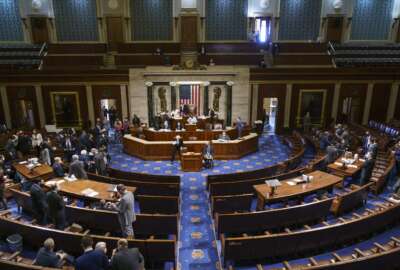Members of Congress hoping to secure higher pay raise for federal employees next year
In today's Federal Newscast, Members of Congress are pushing for a higher pay raise than the White House asked for in 2023.
To listen to the Federal Newscast on your phone or mobile device, subscribe in PodcastOne or Apple Podcasts. The best listening experience on desktop can be found using Chrome, Firefox or Safari.
- Members of Congress are pushing for a 5.1% pay raise for federal workers next year. The increase aligns with the House’s Federal Adjustment of Income Rates, or “FAIR” Act. In a letter to the House Committee on Appropriations, 62 representatives urge the chairwoman and ranking member to implement the increase. They point to a 2020 report that says federal employees make about 23% less than workers in the private sector. The request is half a percent higher than what the White House asked for in it fiscal 2023 budget request.
- OPM is breathing new life into the governmentwide shared services effort for human resources. The Office of Personnel Management is once again reinvigorating the 20-year effort to move agencies to modern human resources systems. OPM will soon survey agencies about their HR IT systems in a first step to creating a marketplace. The survey will ask agencies about the current state of their HR systems and any plans and timeline to modernize them. With the new data, OPM will make recommendations for how best to set up the marketplace under the quality service management office or QSMO. It was during the administration of President George W. Bush when OMB kicked off the HR Line of Business effort.
- Two years into the COVID-19 pandemic, federal employee engagement and satisfaction scores drop in new data from the 2021 Federal Employee Viewpoint Survey or “FEVS.” The Office of Personnel Management reports that engagement decreased from 72% in 2020, down to 71% in 2021. Global satisfaction went down by 5% since 2020, coming in at 64% in 2021. OPM says those scores may reflect agencies’ implementing more hybrid work and return-to-office plans. OPM says it will release its 2022 FEVS on time this fall after the previous two surveys were delayed. (Federal News Network)
- The Biden administration’s focus on diversity, equity, inclusion and accessibility is expanding to the construction and design industry. The General Services Administration issued two requests for information seeking feedback from industry and other experts on how to ensure DEI&A are included in its effort to modernize and construct land ports of entry. GSA outlined more than 30 questions in each RFI ranging from how companies recruit employees to their leadership priorities and involvement in DEI&A issues to benefits of expanding diversity and inclusion efforts. Responses to the RFIs are due by May 12.
- The National Institute of Standards and Technology is exploring how to measure the risks of emerging artificial intelligence technologies in the financial sector. The agency is seeing if there’s a way to use artificial intelligence or machine learning to make banking systems inclusive to more users. NIST Director Laurie Locascio says the first draft of an AI risk management framework released in March for public comment will help in all of these efforts. She says the agency’s scientists and engineers are developing taxonomies, terminologies and testbeds to measure AI risks. (Federal News Network)
- An IRS watchdog is calling on the agency to expand services to the public online. National Taxpayer Advocate Erin Collins says online services from the Social Security Administration and the private sector have heightened expectations for high-quality online services from the IRS. Collins says taxpayers should be able to chat with an IRS representative or provide documentation online. The IRS has some popular online resources, like its “Where’s My Refund?” tool, but many of these are standalone applications that don’t exist in a single hub.
- The Postal Service faces three lawsuits over its plans to purchase mostly gas-powered vehicles as part of its next-generation fleet. The lawsuits argue USPS set the estimated cost for electric vehicles unrealistically high as part of its environmental impact study (EIS) but placed a low bar for the future price of gasoline. The lawsuits claim USPS failed to take a “hard look” at the long-term environmental impact of a mostly gas-powered fleet. The lawsuits claim a new analysis could result in USPS replacing more of its fleet with electric vehicles. California is leading 15 others states in one lawsuit against USPS. Environmental groups and the United Auto Workers are leading two others in California and New York. (Federal News Network)
- The Department of Homeland Security is standing up a new board to counter disinformation about its own policies on the southern border. DHS says the main idea is to tamp down rumors on social media that the border is open to migrants from Latin America. Smuggling groups tend to capitalize on those messages to drum up business. The same board will be tasked with monitoring foreign disinformation campaigns that try to influence U.S. elections. (Federal News Network)
- Agencies and other organizations should be wary of more than a dozen commonly exploited cyber vulnerabilities. That’s the takeaway from a new advisory issued by the Cybersecurity and Infrastructure Security Agency, along with other federal and international partners. The bug in the open source Log4j software library is among the most common vulnerabilities and exposures. CISA is recommending organizations prioritize several mitigations, including enforcing multi factor authentication for all users across their systems.
- The Small Business Administration gets its cybersecurity report card. The SBA’s information security program was deemed “not effective” for fiscal year 2021 by the agency’s inspector general. The IG says the SBA experienced security challenges because it had to process an unprecedented volume of pandemic relief applications. The agency struggled in areas like patch management processes, identity and access management, and contingency planning. SBA agreed with the IG’s recommendations to correct many of the gaps found in its information security program.
- The Senate signs off on two more of President Biden’s nominees for leadership posts in the Department of the Air Force. Kristyn Jones will be the Air Force’s new comptroller and CFO following a voice vote yesterday. The Senate also approved Frank Calvelli as the assistant secretary of the Air Force for Space Acquisition. That’s a brand new post Congress created as part of the 2020 Defense authorization bill.
- The military is seeing record numbers of suicides, especially in remote areas. A government watchdog has some ideas on how to help. Active duty suicides in the military are up by more than 30 percent since 20-16, especially in isolated places like bases in Alaska. The Government Accountability Office says the Defense Department needs to better assess suicide risks at those locations. That means, in part, establishing a process to enhance suicide prevention efforts. GAO says there are gaps in training for key personnel and problems with current policies. The watchdog says by fixing this issue, commanders will be better prepared to provide support to troops.
- The Defense Information Systems Agency says it’s seeing returns on the reorganization it undertook last year. The agency’s deputy director says DISA is better set up for innovation in lower level offices. DISA now has five teams that meet regularly to share ideas and keep the agency in constant communication. DISA has not set up metrics to measure its success, but it says the reorganization is better suited for near-peer competition. (Federal News Network)
Copyright © 2025 Federal News Network. All rights reserved. This website is not intended for users located within the European Economic Area.
Eric White
Eric White is news anchor and Federal Drive producer at Federal News Network.
Follow @FEDERALNEWSCAST






